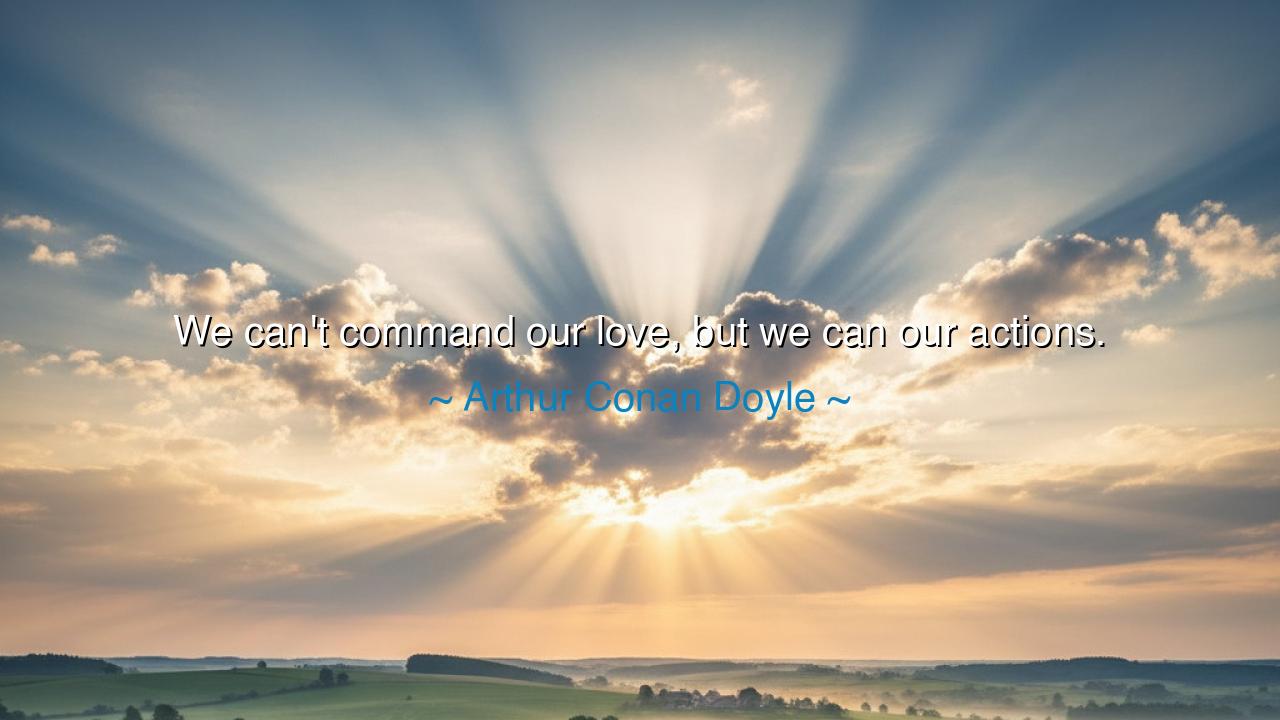
We can't command our love, but we can our actions.






"We can't command our love, but we can our actions." These words, spoken by the great author Arthur Conan Doyle, offer a deep truth about the nature of love and the power of choice. In the realm of love, we are often at the mercy of forces beyond our control—our feelings, emotions, and desires arise spontaneously, sweeping us away in their current. But while we cannot always command the heart, we can command our actions. Love may be an uncontrollable force, but we are still masters of how we express it, how we behave, and how we choose to show it. The quote invites us to recognize that love is not merely something we feel, but something that is also made visible through the choices we make and the actions we take.
In the wisdom of the ancients, love was considered not only a passionate emotion but also a duty and a virtue to be expressed through intentional actions. The Greeks, particularly in the philosophies of Aristotle, saw love as the highest form of connection between people, yet they also recognized the importance of choices in cultivating and sustaining love. Philia, the love of friendship, was not something that happened by chance. It required mutual respect, effort, and action to build a relationship based on trust and understanding. For Aristotle, love was not only about feelings of affection—it was about acting with virtue, choosing to treat others with kindness, respect, and consideration. In this sense, the power of action was central to the cultivation of meaningful love.
Consider the story of Antigone, the tragic heroine of Sophocles’ play. Antigone’s love for her brother, Polynices, led her to defy the laws of the king and bury him properly, even though this act would cost her life. Her love was not just an emotional response, but a choice that required courage and sacrifice. In this story, we see that while Antigone could not control the depth of her love for her brother, she commanded her actions—acting in accordance with what she believed was right, even when the consequences were dire. Her actions, driven by love, ultimately defined her legacy. This reflects Doyle’s idea: that we may not control how deeply we love, but we have the power to direct our actions in accordance with that love, and through those actions, we shape our lives and the lives of others.
Similarly, the life of Nelson Mandela provides an example of how actions can transcend the feeling of love and be a catalyst for justice and unity. While Mandela’s love for his countrymen and his desire for freedom ran deep, it was his actions—his choice to endure long years of imprisonment, his commitment to reconciliation, and his work in uniting a divided nation—that ultimately brought about change. Mandela’s love for equality and justice could not be commanded, but his decisions to fight for it, even at great personal cost, created a legacy that transformed a nation. In this way, his actions became the true expression of his love. Just as Doyle reminds us, the ability to control our actions allows us to shape our destinies, even when our hearts are subject to forces beyond our control.
Doyle’s insight emphasizes the relationship between love and willpower. While we may not always be able to control who we love or how deeply we love, we do have the ability to control how we act upon that love. This is where the power lies: in choosing to act with integrity, kindness, and compassion in our relationships, regardless of the emotional ups and downs we may experience. Love is not a passive experience—it is an active force, requiring us to constantly choose how to express it through our words and deeds. We must recognize that true love is reflected not in feelings alone, but in the choices we make in our interactions with others.
The lesson we can take from Doyle’s quote is the importance of mindful action in expressing love. It is easy to become passive in love, to wait for feelings to guide us, or to think that love is only about sentiment. However, love, when it is nurtured and guided by intentional action, becomes a transformative force in our lives. We can choose to show our love through acts of service, through listening, through patience, and through sacrifice. These actions, over time, build relationships that are not only strong in feeling but in substance.
In your own life, reflect on how your actions align with the love you feel. Are you actively nurturing the relationships that matter most to you? Show love not just in words, but in deeds—in your behavior, in the choices you make, and in the sacrifices you are willing to endure for the people you care about. As Doyle suggests, while you may not always be able to control the depth of your love, you can control how you express it. Let your actions be the truest reflection of your love, and in doing so, you will create relationships that are not only sustained by affection but by the strength of your choices and actions.






AAdministratorAdministrator
Welcome, honored guests. Please leave a comment, we will respond soon